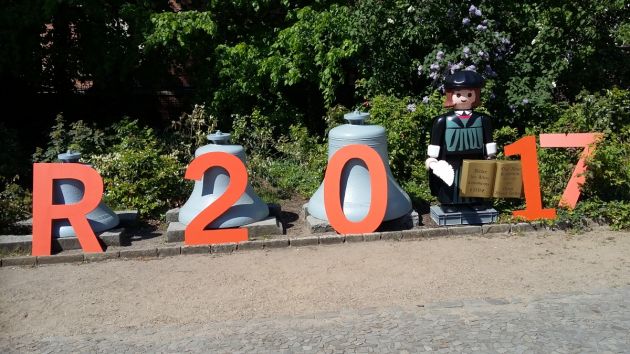500th Reformation anniversary will be ecumenical and include Pope Francis

The 500th anniversary of the Christian Reformation in 2017 is to be profoundly ecumenical, with Pope Francis even taking part in a celebratory service with Lutherans in Sweden in October of this year.
The Reformation anniversary will be both a European and international celebration, says Bishop Heinrich Bedford-Strohm, chair of the Council of the Evangelical Church in Germany (EKD), Stephen Brown reports for the World Council of Churches.
"With this clear distinction from all other commemorations of past centuries, we are sending a signal of reconciliation and a new beginning," Bedford-Strohm said.
He was speaking at a May 9 press conference in Berlin announcing events leading up to the anniversary on Oct, 31, 2017.
The commemoration marks the day in 1517 on which Martin Luther is said to have posted his 95 theses denouncing church abuses on the door of the Castle Church in Wittenberg, Germany.
Luther's actions set in motion events that led to the Reformation and the division of Western Christianity into Roman Catholic and Protestant churches.
The events following the Reformation pitted Catholics and Protestants against one another for many years.
In recent years, however, Roman Catholics and Lutherans have reached agreement on the doctrine of justification, a key dividing issue between the papacy and Luther and his followers, and many doctrinal differences should no longer have a church-dividing character, said Bedford-Strohm.
CATHOLICS AND LUTHERANS REJOICING TOGETHER
The Pope said in 2013 that confronting the historical reality of the Reformation is important as it enables Catholics and Lutherans to rejoice together "in the longing for unity which the Lord has awakened in our hearts, and which makes us look with hope to the future."
The start of the year-long anniversary events will be marked in Germany on Oct. 31, 2016 with a service in Berlin.
On the same day, Pope Francis and Bishop Munib Younan, president of the Lutheran World Federation, will celebrate an ecumenical service in Lund in Sweden, where the LWF was founded in 1947.
They will pray for forgiveness and the healing of the wounds the confessions inflicted on each other over the centuries.
"We will celebrate with them in Berlin," said Bedford-Strohm. "What follows Lund, what kind of dynamic might be started there, nobody knows," he underlined, saying he did "not exclude" a visit by Pope Francis to Germany.
In autumn 2016, Protestant and Catholic leaders from Germany will undertake a common pilgrimage to Israel and Palestine to be reminded of the roots of their common faith.
This will be followed in March 2017 by a joint service of penitence and reconciliation by the Protestant and Catholic churches in Germany.
One of the central events in Germany during the Reformation year will be a Kirchentag, or church convention, in Berlin in May 2017, expected to gather 100,000 people.
Thousands are expected to join the Kirchentag participants for an open-air service on May 28 in Wittenberg, about 62 miles (100 kilometres) south of Berlin.
"Reformation means courageously seeking what is new and turning away from old, familiar customs," said Christina Aus der Au from Switzerland, president of the 2017 Kirchentag.
At the same time, it means asking what sustains and holds people together when everything is changing, and when the world seems out of joint, she said.
In his remarks, Bedford-Strohm underlined that the Reformation "is not just a German affair", pointing to the work of the 16th-century Reformers John Calvin in Geneva, Huldrych Zwingli in Zurich and Martin Bucer in Strasbourg, among others.
The European dimension of the Reformation will be marked by a mobile story truck, "Stories on tour", that will start in Geneva on Nov. 3, 2016.
It will follow a European roadmap linking 68 towns and cities with a Reformation connection in 19 countries before arriving at Wittenberg on May 20, 2017 for the start of a four-month World Reformation Exhibition, "Gates of Freedom".
Here churches, organizations, groups and artists will present their perspectives on the Reformation.
On Oct. 31, 2017 there is an official ceremony planned for Wittenberg. However, the focus will be on a "decentralised" commemoration, said Bedford-Strohm, with services in the various regional churches in Germany.